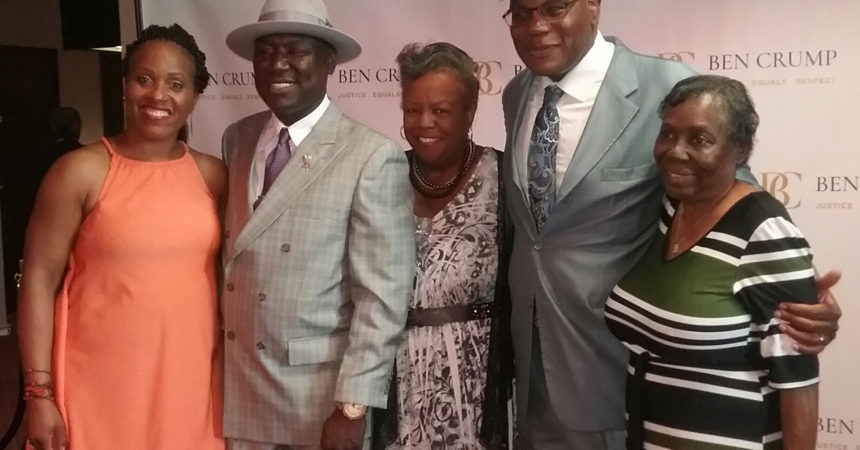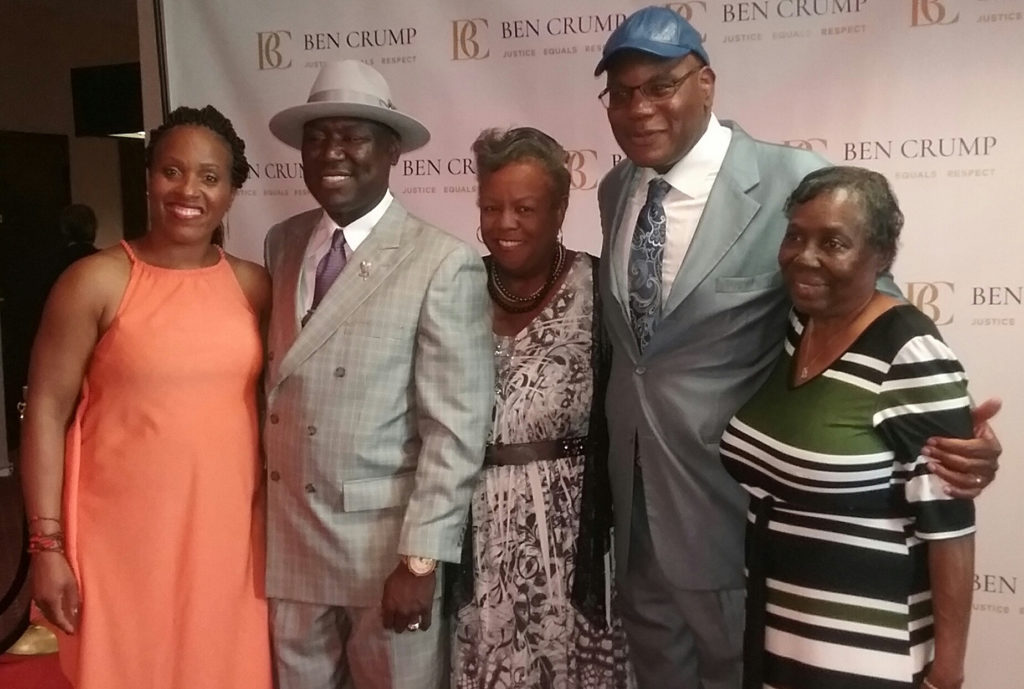
Crump’s role in Marshall brings out large crowd

Benjamin Crump was flanked by his wife Genae Angelique, Gloria Holmes and her husband Rev. R.B. Holmes standing with Crump’s mother, Helen. Photo by St. Clair Murraine
By St. Clair Murraine
Outlook staff writer
While the movie Marshall is far from the biopic that Benjamin Crump’s supporters were hoping to see, the reason they showed up at Regal Governor’s Square was worthy enough to make the trip for the film’s opening.
Crump, a graduate of FSU’s College of Law, plays a cameo role near the end of the movie. He used the opening of the movie this past Friday as a fund-raiser for law students at FAMU and FSU.
A near-capacity audience turned out, some calling the lead role played by Chadwick Boseman as Thurgood Marshall an example of what Crump is living. The movie focused on one case – the state of Connecticut vs. Joseph Spell, a Black chauffeur who was accused of raping a wealthy White woman that he worked for.
Crump has argued several highly-publicized cases, including the shooting of Black teenager Trayvon Martin by a White night watchman.
Marshall could set the tone for a much-needed conversation on race, said Harry Lee Ansted, a retired chief justice in the Florida Supreme Court.
“You have to scratch your head and wonder how much progress we have made in terms of building the community together,” Ansted said. “I’m afraid the facts tell us something different. I’m distressed by the fact that too many cities in Florida, for example, are divided along segregated lines.”
The case documented in the movie is one of the lesser-known that Marshall tried for the NAACP. As it turned out, Marshall was muted by the judge who allowed Marshall’s co-council to do all the talking in court.
But Boseman, as Marshall, pressed on, converting Josh Gad, who played co-counsel Sam Friedman into a civil rights activist.
In an early scene after taking the Spell case, Marshall was attacked by three White men, one carrying a riffle, soon after his arrival in Connecticut for the trial.
Marshall stood up to the White men. That’s something Crump has done many times in real life – only not to anyone carrying a gun – but for his client’s civil rights.
“He has always been willing to take a chance for the benefit of others,” said Tallahassee Judge Ron Flury, while mingling with the crowd that showed up for the screening. “People that didn’t have a voice he has been the voice for them. Good things happen to good people and I couldn’t be more happy for him.”
When director Reginald Hudlin called Crump for the part he’d play – Marshall’s friend Z. Alexander Looby, the Tallahassee attorney didn’t hesitate. He saw it as an opportunity to be in a movie about the man who influenced him to become a lawyer.
As the scene featuring Crump popped on the screen, the theater audience let out a cheer.
While Crump didn’t make his short appearance until near the end, as Marshall was on his way to defend a teenager accused of shooting a White policeman, he was a draw.
The film should generate awareness of the struggles that Marshall, who became the first Black justice in the Supreme Court, endured, said Judge Stephen Everett.
“When you think of Thurgood Marshall, you think of the person who was the great civil rights pioneer in the courtroom where he won the cases that no one thought could be won,” Everett said. “At the same time, it furthers the cause of civil rights and equal access for Blacks.”







